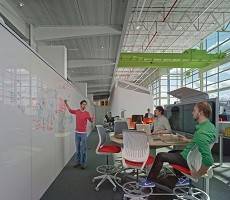February 6, 2015
Over a third of Scottish businesses are based at home (and a fifth started there)
 Over half of businesses in Scotland started in somebody’s home and over a third are still based there, according to a new report from the Federation of Small Businesses (FSB) and researchers from the University of Glasgow. The study of 1,000 Scottish businesses found that 39 percent are based from home and a further 19 percent began life there. The FSB claims that Scottish home based firms turn over around £20 billion a year with three quarters of them with a turnover of less than £100,000 and – perhaps unsurprisingly – only 3 percent with a turnover greater than £500,000. Two thirds also employ at least one additional member of staff. The report’s authors are now calling on Government to acknowledge the significance of these firms and develop policies to help them thrive.
Over half of businesses in Scotland started in somebody’s home and over a third are still based there, according to a new report from the Federation of Small Businesses (FSB) and researchers from the University of Glasgow. The study of 1,000 Scottish businesses found that 39 percent are based from home and a further 19 percent began life there. The FSB claims that Scottish home based firms turn over around £20 billion a year with three quarters of them with a turnover of less than £100,000 and – perhaps unsurprisingly – only 3 percent with a turnover greater than £500,000. Two thirds also employ at least one additional member of staff. The report’s authors are now calling on Government to acknowledge the significance of these firms and develop policies to help them thrive.

















 Avanta Serviced Office Group has signed a deal to establish a new business centre in the heart of London’s Tech City at The Eagle, a 27 storey art-deco-style development on City Road, EC1, from Mount Anvil – Central London’s specialist residential-led developer. The centre is set to open on the 1st March 2015. The new centre will provide over 26,000 square feet of flexible office space over two floors, with approximately 400 desks. Set within a mixed-use development comprising retail, affordable accommodation, offices and high-end residential, it is located within TFL’s Zone 1, approximately five minutes’ walk from Old Street Rail and Underground Station, just two stops from Kings Cross.bThis is Avanta’s first site within Tech City, also known as Silicon Roundabout, which is the third largest technology start-up cluster in the world and home to over 15,000 growing businesses.
Avanta Serviced Office Group has signed a deal to establish a new business centre in the heart of London’s Tech City at The Eagle, a 27 storey art-deco-style development on City Road, EC1, from Mount Anvil – Central London’s specialist residential-led developer. The centre is set to open on the 1st March 2015. The new centre will provide over 26,000 square feet of flexible office space over two floors, with approximately 400 desks. Set within a mixed-use development comprising retail, affordable accommodation, offices and high-end residential, it is located within TFL’s Zone 1, approximately five minutes’ walk from Old Street Rail and Underground Station, just two stops from Kings Cross.bThis is Avanta’s first site within Tech City, also known as Silicon Roundabout, which is the third largest technology start-up cluster in the world and home to over 15,000 growing businesses.








February 11, 2015
This isn’t a golden era for small business; it’s more interesting than that
by Mark Eltringham • Comment, Flexible working, Public Sector, Technology
(more…)